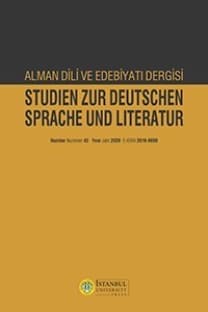Dichter-und-Denker-Mantel-und-Degen’-Romane. Die Poetik des Wunderbaren und des Spiels in den parahistorischen Gebrüder-Grimm- und GoetheRomanen von Kai Meyer und Robert Löhr
Anahtar Kelimeler:
‚Dichter-und-Denker-Mantel-und-Degen’ novels, parahistorical novels, Kai Meyer, Robert Löhr
‚Dichter-und-Denker-Mantel-und-Degen’ novels. The Poetics of the miraculous and the game in the parahistorical Gebrüder Grimm and Goethe novels of Kai Meyer and Robert LöhrAt the turn of the 21st century, a new genre in German popular literature is in the process of developing into increasing complexity. It is the so-called ‚Dichter-undDenker-Mantel-und-Degen’ novel (something like a ‘swashbuckler’ novel about ‘poets and thinkers’), a hybrid of historical novel, adventure novel and fictional biography of poets. The heroes of this new hybrid genre are famous German poets of the past. The plots are freely invented, obviously fictive, but nonetheless interwoven with well-known or at least verifiable historical and biographical facts.My first two examples of this new hybrid genre are two novels about the brothers Grimm, Die Geisterseher (1995) and Die Winterprinzessin (1997) by Kai Meyer. These texts combine the uncanny tone of the classic ‘Geheimbundroman’, a typical German subgenre of gothic fiction about secret confederacies and conspiracies from the end of the 18th century, with the poetic of the marvelous, where wonder and enchantment are part of the fictive universe as in the fairy tales of the brothers Grimm. Next, I investigate Das Erlkönig-Manöver (2007) and Das HamletKomplott (2009) by Robert Löhr. Although these novels about Goethe’s adventures also belong to the parahistorical ‚Dichter-und-Denker-Mantel-und-Degen’ novels and are set at about the same time perios as Meyer’s stories, the tone of these novels is completely different. Instead of the uncanny atmosphere evoked by pathetic language in Meyer’s novels, Löhr’s textworlds are constructed in an ironic tone, as they explore the metafictional potential of intertextual play, allusions and bricolage.
___
Antonsen, Jan Erik (2007): Poetik des Unmöglichen. Narratologische Untersuchungen zu Phantastik, Märchen und mythischer Erzählung. Mentis, Paderborn.Baßler, Moritz (2010): „’Have a nice apocalypse!’ Parahistorisches Erzählen bei Christian Kracht“, in Reto Sorg, Stefan Bodo Würffel (Hrsg.), Utopie und Apokalypse in der Moderne, Paderborn: Wilhelm Fink Verlag, S. 257-272.
Berger, Norbert (2007): „[Rezension zu] Robert Löhrs ‚Der Schachautomat’. Ein spannender historischer Roman im Deutschunterricht“, Literatur im Unterricht, vol. 8/1, S. 59-74.
Demandt, Alexander (2011): Ungeschehene Geschichte. Ein Traktat über die Frage: Was wäre geschehen, wenn…? [1984], Neuausgabe, Vandenhoeck & Ruprecht, Göttingen.
Durst, Uwe (2004): „Zur Poetik der parahistorischen Literatur“, Neohelicon, vol. XXXI/2, S. 201-220.
Eggert, Hartmut (2000): „Historischer Roman“, in: Harald Fricke u.a. (Hrsg.), Reallexikon der deutschen Literaturwissenschaft, vol. 2, de Gruyter Verlag, Berlin u. New York, S. 53-55.
Grass, Günter (2010): Grimms Wörter. Eine Liebeserklärung. Steidl, Göttingen. Heinz, Rölleke, (2007): „Märchen“, in: Reallexikon der deutschen Literaturwissenschaft, Bd. 2, Harald Fricke u.a. (Hrsg.), de Gruyter. Berlin, New York.
Helbig, Jörg (1988): Der parahistorische Roman. Ein literarhistorischer und gattungstypologischer Beitrag zur Allotopieforschung, Peter Lang, Frankfurt am Main.
Henriet, Éric B. (2009): L’uchronie. Paris: Klincksieck.
Hutcheon, Linda (1988): A Poetics of Postmodernism: History, Theory, Fiction, Routledge, London und New York.
Knittel, Anton Philipp (2009): „’Mainz 05’ oder ‚Du bist Teutschland’. [Rezension] Zu Robert Löhrs vergnüglichem Abenteuerroman Das Erlkönig-Manöver“. Verfügbar unter: http://www.literaturkritik.de/ public/rezension.php?rez_id=13233 [Letztes Zugriffsdatum: 13.9.2009].
Löhr, Robert (2010): Das Erlkönig-Manöver [2007], Piper, München.
Löhr, Robert (2011): Das Hamlet-Komplott [2010], Piper, München.
Meyer, Kai (2009): Die Geisterseher. Ein unheimlicher Roman aus dem klassischen Weimar [1995], Aufbau, Berlin.
Meyer, Kai (2009): Die Winterprinzessin. Ein unheimlicher Roman um die Gebrüder Grimm [1997], Aufbau, Berlin.
Nünning, Ansgar (2004): „Historiographische Metafiktion als Inbegriff der Postmoderne? Typologie und Thesen zu einem theoretischen Kurzschluß“, in: Anselm Maler, Ángel San Miguel, Richard Schwaderer (Hrsg.), Europäische Romane der Postmoderne, Peter Lang, Frankfurt am Main, S. 9-35.
Pocci, Luca (2009): „History, Parahistory, and the Uses of Memory in Thimothy Findley’s ‘Famous Last Words’”, in: CLIO. A Journal of Literature, History, and the Philosophy of History, vol. 38/2, S. 151-172.
Rodiek, Christoph (1997): Erfundene Vergangenheit. Kontrafaktische Geschichte (Uchronie) in der Literatur, Vittorio Klostermann. Frankfurt am Main.
Sack, Harald (2008): „Geheimrat als Geheimagent. Über Robert Löhrs Roman Das Erlkönig-Manöver“. Verfügbar unter: http://biblionomicon.blogspot. com/2008/02/ geheimrat-als-geheimagent-robert-lhr.html [Letztes Zugriffsdatum: 9.2.2008].
Simonis, Annette (2005): Grenzüberschreitungen in der phantastischen Literatur. Einführung in die Theorie und Geschichte eines narrativen Genres, Winter, Heidelberg.
Todorov, Tzvetan (1970): Introduction à la littérature fantastique, Seuil, Paris.
Wünsch, Marianne (2003): „Phantastische Literatur“, in: Jan-Dirk Müller u.a. (Hrsg.), Reallexikon der deutschen Literaturwissenschaft, vol. 3, de Gruyter, Berlin u. New York, S. 71-74.
- Başlangıç: 1954
- Yayıncı: İstanbul Üniversitesi
